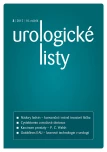-
Medical journals
- Career
Localized renal tumour, epidemiology, aetiology, surgical treatment, operation techniques and their indications, the role of lymphadenectomy
Authors: P. Filipenský; P. Řehořek; Z. Oplatek; R. Hrabec; M. Krechlerová
Published in: Urol List 2012; 10(3): 24-28
Overview
Renal adenocarcinomas [1] represent approximately 3% of all malignant tumours detected in adult population. Approximately 20% of patients [2] have metastases at the time of cancer diagnosis. Bilateral renal cancers are present in approximately 10% of patients. Adenocarcinomas occur 1,5times more often in males [2]. The availability of ultrasound examination has led to an increase in diagnostics of clinically asymptomatic renal cancers. It should be noted that early diagnosis and treatment of renal cancer increases the chance of cure. In case the tumour is detected in its early stage the cancer specific survival (CSS) ranges from 79 to 100%. Approximately 85–92% of expansive renal processes are malignant; the most common type is the conventional renal carcinoma (90%). It is primarily growing from the cell of proximal tubule [10]. Renal tumours classification is based on the 2004 TNM classification and pathological classification is based on the 1997 Heidelberg classification of renal neoplasia.
Key words:
kidney tumour, kidney resection, nephrectomy
Sources
1. American Cancer Society. Cancer Facts and Figures 2012. Atlanta, Ga: American Cancer Society, 2012.
2. www.svod.cz
3. Thoenes W, Storkel S, Rumpelt HJ et al. Cytomorphological typing of renal cell carcinoma – a new approach. Eur Urol 1990; 18 (Suppl 2): 6–9.
4. Kovacs G, Akhtar M, Beckwith BJ et al. The Heidelberg classification of renal cell tumours. J Pathol 1997; 183(2): 131–133.
5. Latif F, Duh FM, Gnarra J et al. von Hippel-Lindau syndrome: cloning and identification of the plasma membrane Ca(++)-transporting ATPase isoform 2 gene that resides in the von Hippel-Lindau gene region. Cancer Res 1993; 53(4): 861–867.
6. Lendvay TS, Marshall FF. The tuberous sclerosis complex and its highly variable manifestations. J Urol 2003; 169(5): 1635–1642.
7. Bonné AC, Bodmer D, Schoenmakers EF et al. Chromosome 3 translocations and familial renal cell cancer. Curr Mol Med 2004; 4(8): 849–854.
8. Woodward ER. Familial non-syndromic clear cell renal cell carcinoma. Curr Mol Med 2004; 4(8): 843–848.
9. Schmidt L, Duh FM, Chen F et al. Germline and somatic mutations in the tyrosine kinase domain of the MET proto-oncogene in papillary renal carcinomas. Nat Genet 1997; 16(1): 68–73.
10. Nickerson ML, Warren MB, Toro JR et al. Mutations in a novel gene lead to kidney tumors, lung wall defects, and benign tumors of the hair follicle in patients with the Birt-Hogg-Dube syndrome. Cancer Cell 2002; 2(2): 157–164.
11. Cheville JC, Blute ML, Zincke H et al. Stage pT1 conventional (clear cell) renal cell carcinoma: pathological features associated with cancer specific survival. J Urol 2001; 166(2): 453–456.
12. Grignon DJ, Che M. Clear cell renal cell carcinoma. Clin Lab Med 2005; 25(2): 305–316.
13. Algaba F, Trias I, Scarpelli M et al. Handling and pathology reporting of renal tumor specimens. Eur Urol 2004; 45(4): 437–443.
14. Van Poppel H. Conservative vs radical surgery for renal cell carcinoma. BJU Int 2004; 94(6): 766–748.
15. Kim SP, Thompson RH, Boorijan SA et al. Comparative Effectiveness for Survival and Renal Function of Partial and Radical Nephrectomy for Localized Renal Tumors: A Systematic Review and Meta-Analysis. J Urol 2012; 188(1): 51–57.
16. Kim SP, Leibovich BC, Shah ND et al. The relationship of postoperative complications with in-hospital outcomes and costs after renal surgery for kidney cancer. BJU Int 2012; Epub ahead of print.
17. Marszalek M, Ponholzer A, Brossner C et al. Elective open nephron sparin Sumery for renal masses: single – center experience with 129 consecutive patiens. Urology 2004; 64(1): 38–42.
18. Eret V, Hora M et al. Současné možnosti miniinvazivní léčby nádorů ledvin. Praha: Galén 2011; 100 s., příloha DVD (7 videí).
Labels
Paediatric urologist Urology
Article was published inUrological Journal

2012 Issue 3-
All articles in this issue
- Robot assisted radical cystectomy: the Mayo Clinic technique
- Continent and incontinent urinary diversion, bladder sparing approaches
- Minimal invasive ablation techniques in small renal tumours treatment
- Current view on small renal masses
- Value of treatment, risk and responsibility in urological practice
- Localized renal tumour, epidemiology, aetiology, surgical treatment, operation techniques and their indications, the role of lymphadenectomy
- Complete duplication of bladder and urethra as organic cause of lower urinary tract dysfunction
- Rare complicaton of insertion double J stent – migration to right heart atrium
- EAU Guidelines on laser technologies
- Readmission and complication rates in patients undergoing PCNL, stratified by co-morbid factors
- Urological Journal
- Journal archive
- Current issue
- Online only
- About the journal
Most read in this issue- Rare complicaton of insertion double J stent – migration to right heart atrium
- Continent and incontinent urinary diversion, bladder sparing approaches
- Current view on small renal masses
- Robot assisted radical cystectomy: the Mayo Clinic technique
Login#ADS_BOTTOM_SCRIPTS#Forgotten passwordEnter the email address that you registered with. We will send you instructions on how to set a new password.
- Career

